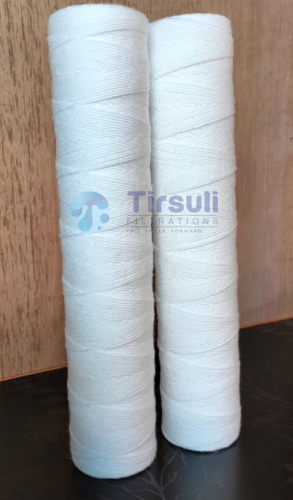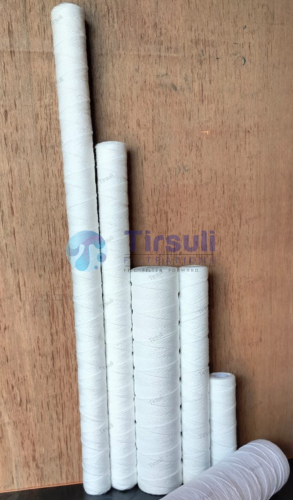Products
Reliable Depth Filtration for Industrial & Commercial Applications
String Wound Cartridge Filters
String Wound Cartridge Filters are versatile, high-efficiency filters used in a variety of industrial applications to remove unwanted particles from liquids. These filters are constructed by winding layers of yarn—such as polypropylene, cotton, or glass fiber—around a central core. This unique design enables them to trap both large and small particles through a process known as depth filtration.
Widely used in industries such as water treatment, pharmaceuticals, food & beverage processing, and chemicals, String Wound Cartridge Filters offer long-lasting performance and are perfect for applications requiring high dirt-holding capacity. Whether you need to filter out sediments, rust, or other contaminants, these filters provide reliable, cost-effective solutions that protect your systems and enhance the quality of your products.


What Are String Wound Cartridge Filters?
String Wound Cartridge Filters are specialized filters made from layers of yarn wound around a central core. These filters are designed to capture particles, dirt, and debris from liquids like water, chemicals, paints, and oils. The yarn is wound in a way that creates multiple layers of filtration, with each layer trapping different sizes of particles. This “depth filtration” ensures that the filter holds a large amount of dirt before it needs to be replaced
🔧 How Do String Wound Cartridge Filters Work?
String Wound Cartridge Filters operate on the principle of depth filtration, which means they capture particles not just on the surface, but throughout the entire length of the filter. The filter is made by tightly winding yarn (usually polypropylene, cotton, or glass fiber) around a central core, creating a series of layered, progressively tighter windings. When liquid flows through the filter, it enters from the outside and moves inward toward the center.
As the liquid passes through the filter, larger particles are captured by the outermost layers, while finer particles are trapped deeper within the wound layers. This design maximizes the filter’s dirt-holding capacity and ensures that it performs efficiently over an extended period of time. The tightly wound structure prevents the filter from becoming clogged too quickly, allowing for higher flow rates and longer use. The multi-layered structure ensures that the filter can handle varying particle sizes and concentrations, making it suitable for a wide range of filtration needs.
This process results in cleaner liquids and helps protect downstream equipment, such as pumps, membranes, or other filtration devices, by preventing blockages and wear caused by large particles. Whether you’re filtering water, chemicals, or food products, String Wound Cartridge Filters deliver reliable, consistent performance.
Applications of String Wound Cartridge Filters
String Wound Cartridge Filters are widely used across various industries due to their versatility and effectiveness in removing suspended particles from liquids. Here’s a detailed look at where they are most commonly applied:
Water Treatment (RO & DM Plants)
These filters are ideal for removing sediments and particles before they enter reverse osmosis (RO) membranes or demineralization (DM) systems. They help improve the efficiency of water treatment processes and protect sensitive equipment from clogging and damage.
Chemical & Pharmaceutical Processing
String Wound Cartridge Filters are used in chemical and pharmaceutical industries to filter out contaminants from solvents, liquids, and reagents. Their ability to handle a variety of chemicals makes them suitable for maintaining purity and ensuring consistency in production processes.
Paints, Inks & Dyes
These filters play a crucial role in the paints, inks, and dyes industries by removing pigments, undissolved particles, and gels. This ensures the final product is smooth, consistent, and of the highest quality.
Food & Beverage Industry
In the food and beverage industry, String Wound Cartridge Filters are used for filtering liquids such as syrups, juices, edible oils, and process water. They help ensure that the final products are free from contaminants while meeting strict hygiene and quality standards.
Textile & Dyeing Units
String Wound Cartridge Filters are used in textile and dyeing industries to prevent clogging in dye baths and jet dyeing machines. They help maintain consistent color quality by filtering out undissolved dyes and particles.
Specialty Chemicals & Cosmetics
In specialty chemicals and cosmetics manufacturing, these filters are used to remove fine particles and impurities from chemical solutions, emulsions, and creams, ensuring clarity and consistency in the final products.
📋 Technical Specifications of String Wound Cartridge Filters
Feature | Details |
|---|---|
Micron Rating | 1 µm to 100 µm |
Cartridge Lengths | 10”, 20”, 30”, 40” (Custom sizes available) |
Yarn Material | Polypropylene, Cotton, Glass Fiber |
Core Material | Polypropylene, Stainless Steel, Tin-plated |
Max Operating Temperature | 80°C (Polypropylene), 120°C (Cotton Yarn with SS Core), 250°C (Glass Fibre) |
Max Pressure Drop | 2.5 bar (clean) |
Flow Direction | Outside to Inside |
Filter Configuration | DOE, SOE, Custom ends available |
🎯 Why Choose Our String Wound Cartridge Filters?
- Made in India – Proudly manufactured to meet local and global standards
- Direct Manufacturer Supply – Better prices, faster lead time
- Wide Industry Experience – Trusted by clients in pharma, water treatment, chemicals & more
- Strict Quality Control – Each filter passes performance testing
- Technical Support – Our team can recommend the right filter for your needs
📞 Request a Quote or Sample
We understand that choosing the right filter can be technical. That’s why we offer:
Free consultations
Sample requests
Quick delivery and support
Contact Us Today
📞 Phone: +91 7558593684
📧 Email: tirsulifiltrations@gmail.com
🌐 Website: www.tirsuli.in
📝 Request a Quote Form
Frequently Asked Questions (FAQs)
Q1: What makes String Wound Cartridge Filters different from other filters?
A: Unlike surface filters, these offer depth filtration—trapping particles throughout the filter body instead of just on the surface. This increases capacity and lifespan
Q2. What’s the difference between a string wound filter and a melt blown filter?
While both are depth filters, string wound filters have a more gradual density gradient, making them better for applications requiring pre-filtration or staged contaminant capture. Melt blown filters, on the other hand, offer more uniform structure and are often used for fine particulate removal at stable flow rates.
Q3. Can these filters handle chemical or corrosive fluids?
Yes—but only if you select the right yarn and core combination.
Use polypropylene media for most mild chemicals.
Use glass fiber or cotton with stainless steel core for high-temp or aggressive fluids.
Contact us for material compatibility charts if needed.
Q4. Can I use string wound filters for food-grade applications?
Absolutely. Our polypropylene string wound filters are manufactured using FDA-compliant materials, making them safe for food and beverage filtration, including bottled water, syrups, and edible oils.
Q5. Can Tirsuli Filtrations help with system compatibility or trials?
Yes, we often assist customers with trial samples, performance testing, or selecting filters that integrate seamlessly into existing systems. Reach out to our technical support team for assistance.
Q6. How do I select the right string wound filter for my application?
Start by identifying the following:
The fluid type (water, chemical, oil-based, etc.)
The temperature and pressure of the system
Required micron rating (based on particle size to remove)
Required flow rate
Q7. Can you supply bulk or customized orders?
Yes, we specialize in bulk orders, OEM supply, and custom manufacturing based on your required length, micron rating, core material, or end caps.
Q8. Are these filters reusable?
String wound filters are designed as disposable elements. Cleaning or reusing is not recommended, as it can compromise filtration performance.
Q9. What sizes do you offer?
Common sizes include 10″, 20″, 30″, and 40″ length filters with diameters of 2.5″ or 4.5″ (Jumbo). Custom sizes are available on request.
Q10. How can I order or get a quote?
You can reach out via our contact form, email us at tirsulifiltrations@gmail.com, or phone/ whatsapp on +91 9823114195, and our team will get back with a customized quotation or technical support.
